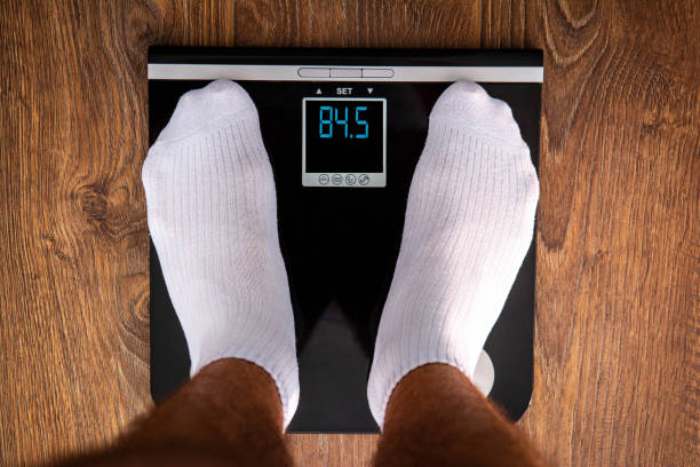Have you ever stepped on the scale only to be questioned why does my scale keep changing my weight? You’re not alone. Your scale isn’t playing tricks on you, and it’s likely due to various factors, including placement, usage, and your body’s natural fluctuations.
The placement of your scale can greatly influence the reading, and consistency in usage is key to accurate measurements. Moreover, your body’s composition and daily changes can also cause variations. Even the most accurate scales aren’t foolproof.
So, don’t fret over the digits too much; they’re just part of the story. Let’s delve deeper into why does my scale keep changing my weight.
Contents
How Scales Operate and Provide Weight Readings?
To fully grasp why your scale’s readings fluctuate, you must delve into the mechanics behind its function.
One critical aspect involves scale calibration. It’s the process of setting the scale to display correct measurements, often done in a controlled environment during manufacturing.
However, over time, your scale can drift from its original calibration due to environmental factors like temperature changes or physical factors like wear and tear. This results in measurement variations, causing those perplexing weight fluctuations.

Moreover, it’s vital to understand that scales don’t measure weight directly. They measure the force that gravity exerts on your body. Since gravity can vary slightly from place to place, your scale’s readings might too.
Impact of Placement on Weight Measurements:
Before stepping on your scale next time, consider where it’s placed because the location can significantly affect your weight readings. The surface stability under your scale is vital. An uneven or soft surface can throw off weight calibration, leading to inconsistent readings.
| Placement | Surface Stability | Impact on Weight Calibration |
|---|---|---|
| Bathroom Tile | High | Accurate |
| Carpet | Low | Inaccurate |
| Wooden Floor | Medium | Semi-accurate |
Placing your scale on a hard, flat surface, like bathroom tile, typically ensures the highest surface stability.
In contrast, a soft or uneven surface, like a carpet, can lead to inaccurate readings. Therefore, it’s key to consider the placement of your scale to ensure accurate weight measurements.
Importance of Consistent Usage:
You’ve got to realize that consistent usage of your scale simultaneously each day can significantly improve the accuracy of your weight readings.
This is where the concept of ‘Routine Timing’ comes into play. By weighing yourself simultaneously, you’re eliminating fluctuations due to meals, hydration, and daily activities.
Now, let’s talk about ‘Precise Clothing’. Clothes can have a surprising impact on your weight readings. To maintain consistency, it’s advisable to weigh yourself in the same, minimal clothing each time. Remember, your scale isn’t judging your fashion sense but quantifying the precise mass exerted on it.
Role of Body Composition in Weight Fluctuations:
The changes in your body composition play a crucial role in your weight fluctuations, and it’s essential to understand this aspect. Hydration Influence is a significant factor, as the amount of water in your body can increase or decrease your weight. Even minor changes in hydration levels can cause significant weight variations.
Metabolic variations also contribute to weight fluctuations. Your metabolic rate, influenced by muscle mass and fat percentage, determines how quickly you burn calories. A higher muscle-to-fat ratio leads to a faster metabolism, which can result in weight loss. Conversely, a higher fat-to-muscle ratio slows your metabolism, potentially leading to weight gain.
Understanding these factors can help you interpret the changes in your scale readings more accurately.
Decoding the Inaccuracy of Scales:
Now, let’s decode why your scale mightn’t be giving you the most accurate weight readings.
The key culprit often lies in scale calibration. Calibration is the process that ensures your scale provides precise and consistent readings over time. If your scale isn’t correctly calibrated, it can lead to significant measurement errors. This means you could weigh yourself twice within minutes and get two readings.
Moreover, environmental factors like temperature and humidity can also distort readings. Most scales aren’t designed to adapt to these changes, causing inaccuracies.
Frequently Asked Questions:
Your diet, particularly salt consumption, affects water retention and hormonal fluctuations, which can cause weight fluctuations. Drinking more water can help flush out excess salt and stabilize your weight.
Yes, medication can indeed alter your weight measurements. Some medicines have side effects like fluid retention or increased appetite, leading to weight gain. Others, particularly those affecting hormones, can cause weight loss.
For accurate results, weigh yourself in the morning, after using the restroom, and before eating or drinking. This ensures weighing consistency. Ensure your scale’s calibration is correct, too. Changes in body hydration can affect weight.
Regular exercise impacts your weight on the scale primarily through exercise intensity and muscle mass increase. Intense workouts burn more calories while boosting muscle mass, making you heavier due to muscle density.
Yes, your clothing can indeed affect scale readings. Fabric weight influence and clothing material impact can add extra pounds. It’s best to weigh yourself in light clothing or none for the most accurate result.
Conclusion:
Your scale isn’t playing tricks on you. Weight fluctuations are normal due to scale placement, time of day, and body composition changes.
Understand these variables to interpret your weight accurately. Remember, scales aren’t always precise but offer a general gauge.
Don’t let minor weight changes discourage you. Focus on overall health, not just a number. Science proves your worth isn’t measured in pounds, so be patient consistent, and keep going!

Santhan, known to many as Linda, combines her personal training expertise with exceptional motivational coaching skills. Her articles are not just informative but also incredibly inspiring, encouraging readers to take action and pursue their fitness goals. Linda’s unique approach to writing integrates practical fitness guidance with motivational elements, making her content both useful and uplifting.
